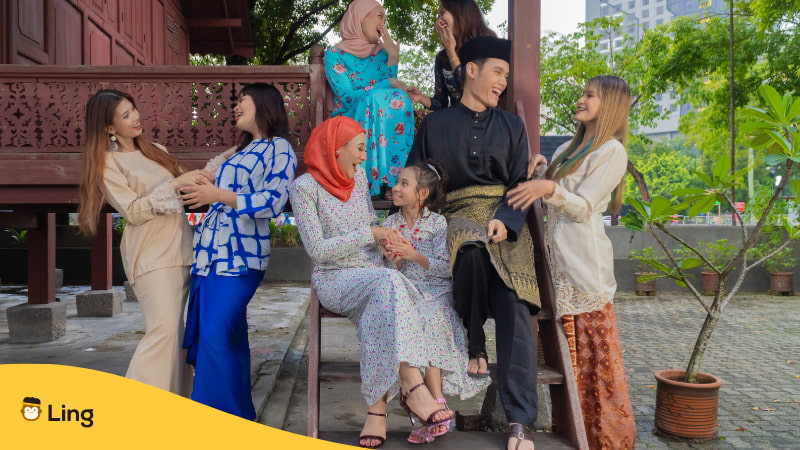Have you ever ever wished to talk Malay fluently to attach extra deeply along with your grandparents or honor your loved ones’s roots?
Language isn’t only a instrument for communication; it’s a bridge to understanding your heritage and fostering significant connections.
Whether or not you’re trying to uncover household tales or embrace your cultural id, this information brings collectively 10 sensible tips about how one can converse Malay extra fluently that will help you unlock a richer, extra private connection along with your heritage.
This information isn’t about textbook Malay however sensible, conversational ideas designed that will help you converse Malay confidently and authentically.
From mastering casual speech to tapping into cultural expressions, these methods deal with making your journey private and efficient.
Let’s discover how embracing Malay can grow to be your gateway to household and custom whereas reaching fluency sooner than you assume!
How To Communicate Malay Shortly: High 8 Most Necessary Ideas


1) Hear & Digest!
In case your objective is to attach along with your heritage, begin by immersing your self within the pure rhythm of Malay speech.
Listening to how native audio system work together supplies insights into pronunciation, tone, and cultural nuances.
Watch Malay TV reveals like Upin Ipin or TV3 dramas, or tune in to conventional songs your grandparents could have liked. Hearken to greetings in Malay like terima kasih (thanks) and selamat pagi (good morning) to listen to how they’re pronounced in on a regular basis contexts.
For a extra private contact, ask your loved ones members to share tales in Malay—it’s a wonderful strategy to study how one can converse Malay whereas reconnecting along with your roots.
2) Imitate Locals & Communicate The Language!
The most effective methods to honor your heritage is by talking the language as authentically as potential.
Mimic the sounds, expressions, and intonations you hear from native audio system, whether or not on TV, in music, or immediately from household conversations.
Strive repeating phrases like saya nak makan nasi (I need to eat rice) or jom pergi pasar (let’s go to the market) to follow your Malay pronunciation.
Small every day efforts, like training only a few phrases, can add up over time and construct confidence.
Your grandparents will probably be thrilled to listen to you attempt, even when it’s not excellent—the hassle and connection matter most.
3) Bear in mind Widespread Malay Phrases By Coronary heart
Figuring out on a regular basis phrases by coronary heart is essential for significant conversations with household.
Phrases like apa khabar? (how are you?) or jom makan! (let’s eat!) carry cultural heat and are nice icebreakers with kinfolk. Give attention to conversational phrases that may assist you to work together naturally.
Repetition is vital—write, say, and listen to these phrases every day to make them second nature.
This consistency ensures you may confidently have interaction with family members with out hesitation or worry of stumbling over phrases.


4) Be taught Malay Slangs
Malay slang phrases replicate the center of the Malay tradition, making them a pleasant strategy to join with your loved ones on a deeper stage.
Whereas commonplace Malay is important, incorporating Bahasa Pasar (colloquial Malay) will assist you to sound extra like an area and bridge generational gaps.
For instance, as an alternative of the formal Sudahkah kamu makan? (have you ever eaten?), attempt saying dah makan belum? to echo how your grandparents or native Malays would possibly converse.
Studying and utilizing these expressions reveals respect for the tradition and helps you’re feeling nearer to your roots.
| English | Malay (Do’s) (✓) | Malay (Don’ts) (X) |
|---|---|---|
| You look stunning right now | Awak nampak berseri hari ini | Anda kelihatan cantik hari ini |
| Wow, your own home is so clear | Wah, bersihnya rumah awak | Wah, rumah anda sangat bersih |
| That shirt appears good on you | Baju tu sesuai dengan awak | Baju itu kelihatan baik untuk anda |
When making compliments in Malay, it’s essential to make use of the right stage of ritual. For instance, “Awak nampak berseri hari ini (You look stunning right now)” is extra informal, whereas “Anda kelihatan cantik hari ini (Your honor’s look is actually putting right now)” is extra formal. Keep away from utilizing overly formal phrases in informal settings and use context-appropriate language to sound pure. Give attention to being real and respectful, and alter your tone and phrasing primarily based on the connection and setting.
5) Look Up New Phrases & Strive Them Out With Household
Discovering and training new Malay phrases is an enriching strategy to bond along with your family members. Select phrases or phrases associated to household, meals, or traditions that resonate along with your heritage.
As an example, study the phrase nenek (grandmother) or baju kurung (conventional costume) and use them in context.
Ask your loved ones for corrections or explanations, turning your studying journey right into a shared expertise.
This lively engagement boosts your vocabulary and deepens your connection to your loved ones’s historical past and traditions.


6) Sing Alongside To Malay Songs!
Music is a robust strategy to study Malay and embrace your cultural id. Search for conventional Malay songs your grandparents would possibly know, comparable to Rasa Sayang or trendy hits they get pleasure from.
Singing alongside helps you follow pronunciation, perceive widespread expressions, and really feel the emotional connection these songs convey.
Don’t hesitate to ask your loved ones concerning the songs they love—this straightforward act can spark fantastic conversations about shared recollections and heritage.
7) Indulge In Malay Pop Tradition
Exploring Malay popular culture is an satisfying strategy to study the language whereas honoring your roots.
Watch basic movies, discover conventional dances, or learn Malay people tales your grandparents might need advised you as a toddler.
Reveals like Upin Ipin or Seniman Bujang Lapok can introduce you to on a regular basis slang and cultural references.
Partaking with these types of leisure not solely enriches your vocabulary but additionally offers you a deeper appreciation for the traditions and values your loved ones cherishes.
8) Differentiate Between Formal and Casual Malay
Understanding the distinction between Bahasa Pasar (Casual Malay) and Bahasa Baku (Formal Malay) is important for heritage hunters who need to join deeply with their household’s tradition.
Particularly amongst older generations who won’t have had entry to formal schooling, casual Malay—rooted in informal, market-style communication—is the norm.
These casual expressions, used with pals, household, and friends, carry heat and familiarity.
Ideas For Utilizing Casual Malay Vs. Formal Malay: Bridging Generations
1) Use Casual Malay with Elders
Strengthen your bond with grandparents and different elders by adopting casual Malay. For instance, as an alternative of utilizing formal pronouns like saya or anda, go for aku (I) and kau (you).
This creates a way of closeness and belief, which is essential when constructing a deeper connection along with your heritage.
For instance, attempt saying, “Nenek nak makan apa? Aisha beli” (“What would Grandma prefer to eat? Aisha will purchase.”) as an alternative of utilizing formal pronouns.
2) Stability Respect With Informality
Whereas casual Malay fosters connection, make sure you steadiness it with respect, particularly when talking with elders.
Use phrases like Atuk (Grandfather) and Nenek (Grandmother) as an alternative of utilizing direct pronouns. This reveals cultural respect whereas maintaining the dialog heat and pleasant.
3) Decide For Protected, Formal Malay When Uncertain
When you’re unsure about how casual you may go, follow saya (I) for politeness with out feeling overly formal.
Saya is broadly accepted in most conditions, guaranteeing respect is maintained with out distancing your self out of your family members. When you’re not sure how one can tackle somebody, household phrases like uncle (pakcik), auntie (makcik), grandfather (atuk), or grandmother (nenek) are at all times secure.
As an example, you would possibly say, Nenek nak makan apa? Aisha beli (“What would Grandma prefer to eat? Aisha will purchase.”) slightly than utilizing kau, anda, aku, or says.
4) Distinguish Casual Vs. Formal Malay With Sensible Examples
Be taught the important thing variations between Bahasa Pasar (casual) and Bahasa Baku (formal) by referring to useful assets.
The Ling app provides interactive classes and pronunciation guides to follow each types of Malay, making it simple to include these variations into every day conversations with household and others in your neighborhood.
| English | Bahasa Pasar (Casual Malay) | Bahasa Baku (Formal Malay) |
|---|---|---|
| Hello, how are you? | Hai, apa khabar? | Apa khabar? |
| I’m doing effective, thanks! | Okay je, terima kasih. | Saya baik, terima kasih. |
| The place are you going? | Kau nak pergi mana? | Anda mahu pergi ke mana? |
| I’m going to work. | Aku nak pergi kerja. | Saya hendak pergi bekerja. |
| Do you need to eat with me? | Nak makan dengan aku tak? | Mahu makan bersama saya? |
| Let’s go have lunch. | Jom pergi makan tengah hari. | Mari kita makan tengah hari bersama. |
| What are you doing now? | Kau tengah buat apa sekarang? | Apa yang sedang anda lakukan sekarang? |
| I’m simply enjoyable. | Tengah rilek je. | Saya sedang berehat sahaja. |
| Are you able to assist me with this? | Boleh tolong aku tak? | Bolehkah anda bantu saya dengan ini? |
| Thanks a lot! | kasih banyak! | Terima kasih banyak. |
| Sorry, I’m busy proper now. | Maaf, tengah sibuk sekarang. | Maaf, saya sibuk sekarang. |
| I’ll name you later. | Aku name kau nanti. | Saya akan hubungi anda kemudian. |
| I don’t perceive. | Aku tak faham. | Saya tidak faham. |
| See you tomorrow! | Jumpa esok! | Jumpa anda esok. |
| I actually like this place! | Aku suka gila tempat ni! | Saya sangat suka tempat ini. |
How Do You Say “Communicate Malay” In Malay?
To reconnect with your loved ones’s linguistic traditions, you may say cakap dalam Bahasa Melayu or just cakap Melayu to your family members if you happen to want to converse the language with them, which interprets to “converse Malay.” The phrase cakap means “to talk,” dalam means “in,” and Bahasa Melayu refers back to the Malay language. In formal contexts, comparable to describing somebody’s potential to make use of the language, you would possibly say they berbahasa Melayu. These phrases replicate greater than language—they’re a bridge to a wealthy cultural legacy. Studying these expressions permits for extra significant communication along with your family members, whether or not informal or formal.


Continuously Requested Questions About How To Communicate Malay
Is Malay Simple To Be taught?
Malay is commonly thought of approachable for novices, particularly these trying to strengthen ties with their cultural roots.
Its grammar is simple, with no tenses or complicated conjugations, and it makes use of the Latin alphabet, making it extra acquainted to English audio system.
As a result of it’s phonetic, phrases are pronounced as they’re spelled.
Whereas the fundamentals come shortly, mastering the nuances of Malay—comparable to idiomatic expressions or regional dialects—requires dedication.
Common follow, particularly with relations or native audio system, can deepen your connection to the language and your id.
Can You Communicate Malay In Thailand?
Malay is spoken in Thailand’s southern provinces, notably in Yala, Pattani, and Narathiwat.
The number of Malay there, generally known as Pattani Malay, has deep cultural significance and displays the shared linguistic ties with Malaysia.
Whereas Thai is the predominant language, Malay performs a significant function in on a regular basis communication amongst native communities.
If your loved ones roots hint again to this space, studying Pattani Malay will help you join with its distinctive cultural and linguistic traditions whereas constructing stronger relationships with the native inhabitants.
Can I Be taught Malay In 1 Month?
With dedication, you may study how one can converse Malay in a single month to carry easy conversations and join with relations.
You’ll make regular progress by specializing in important phrases, training every day, and utilizing studying instruments like apps or on-line assets.
Nevertheless, turning into fluent or gaining a deeper understanding of the cultural nuances takes time.
Immersing your self in conversations with family members or listening to native audio system will assist you to study sooner whereas fostering a stronger connection to your linguistic roots.
Reconnect With Your Heritage Immediately With These Helpful Ideas!
Studying Malay is greater than phrases—it’s a strategy to honor your loved ones’s linguistic traditions and foster significant connections.
You’ll develop a deeper understanding of the language by following ideas like Differentiate Between Casual and Formal Malay or Hear & Digest!
Whenever you Imitate Locals and Communicate the Language! or Bear in mind Widespread Malay Phrases by Coronary heart, you’ll really feel extra assured in conversations, bridging generational gaps with family members.
Let this journey be extra than simply language acquisition; let it’s a celebration of your loved ones’s cultural id.
Embrace The Malay Language And Tradition
Studying Malay isn’t nearly mastering vocabulary—it’s about rekindling your ancestors’ tales, deepening your bond with family members, and preserving the cultural traditions that formed your loved ones.
You’re bridging generations and celebrating your roots with each phrase you study.
This weblog has outlined the eight greatest tips about how one can converse Malay shortly.
The following pointers assist you to join emotionally and linguistically along with your heritage. However don’t cease right here! To proceed your Malay studying journey, try the Ling app for interactive classes, enjoyable quizzes, and sensible workout routines.
Obtain it right now and Be taught Malaysian right now to confidently embrace the fantastic thing about your loved ones’s cultural legacy!


